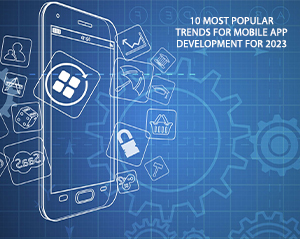
Close



All businesses must develop mobile apps in order to survive in this fast-paced digital world. Developers incorporate out-of-the-box features to improve user experiences with the latest advancements in IoT, VR-AR, AI, and Chatbot technologies. Let us investigate and uncover the most common trends in mobile app development.
With over 3.2 billion smartphone users worldwide, it's no surprise that the mobile app market is growing, according to Statista. Consider the following statistics from the same source:
By 2023, mobile apps are estimated to produce more than $935 billion in revenue. The Apple App Store offers 1.96 million apps for download. The Google Play Store has 2.87 million apps available for download.
Almost all small businesses or startups have realised the importance of mobile app development in order to stay competitive. According to a recent Google survey, the list of most downloaded apps from the Play Store includes apps built with IoT, AI, AR-VR, and Chatbot technologies, which most Android users are unaware of. This enables Android developers to create mobile apps with exceptional user experiences by incorporating out-of-the-box functionality. As a result, developers embrace new mobile app development trends in order to increase engagement and downloads, hence increasing income generating.
Business apps should be coupled with Chatbots to provide an exciting user experience and improve customer contact.
In the last year, some of the most popular and trending Chatbots have been:
While you are merely thinking about getting one, a number of organisations have supported Chatbot development and have linked it with their mobile apps.
Voice-enabled technology has revolutionised the artificial intelligence sector. Since the release of Google Assistant and Siri, iOS/Android developers have been required to incorporate AI into their mobile app development process in order to provide a better experience and boost mobile app capabilities. Businesses can engage their customers more effectively by utilising mobile apps that provide real-time insights via machine learning technologies, advanced analytics, and cognitive interfaces.
Although it is obvious that AR and VR are being employed increasingly in the entertainment industry, the moment will come when these technologies will dominate other industries as well. AR and VR mobile apps provide a real-world environment and recreate real-world scenarios. Large corporations are boosting their investments in AR and VR projects in order to increase enterprise application development for industries such as healthcare, real estate, retail, manufacturing, food and drinks, and many more.
Your business app should stand out from the crowd by recommending services or goods that are most suited to the consumer. The latest Android and iOS versions make excellent use of machine learning by incorporating recommendation engines into mobile apps. Machine learning algorithms employ massive data from various sources to discover complicated patterns and derive helpful insights.
Within a short period of time, blockchain technology has grown in prominence as an infrastructure for Bitcoins. Blockchain technology will benefit not only bitcoin, but also financial ledger tools for the banking industry. The primary purpose of utilising blockchain is to improve security and the integrity of digital ledgers. These shared and highly secure ledgers list a wide range of financial transactions and record transaction history.
In a very short period of time, on-demand smartphone apps have become a vital part of human life. Through an on-demand service delivery system, users can obtain a variety of services such as food delivery, taxi, laundry, cleaning, and beautification. Businesses have previously increased income by 30% by providing on-demand services to clients.
Cloud-based app development technology is another trend in mobile app development. Cloud technologies are used by businesses to construct business apps that provide smooth operation processes and increased productivity. Mobile apps created with cloud technology retrieve data from cloud storage, which reduces the strain on internal memory. This is advantageous to business owners since it improves the user experience.
Your viewers do not appreciate having to wait for the web page to load. Since Google established the AMP Project, online businesses and brand websites have reaped significant benefits in terms of offering visitors with quick webpage loading capabilities. AMP development, in general, attracts visitors, speeds up content replacement, simplifies mobile search, and improves ad visibility. AMP improves the user experience of cross-platform web-based mobile apps.
IoT and wearables are altering how enterprise mobile apps are created. Wearables nowadays do not have the ability to directly instal programmes, but they can communicate with other devices in some fashion. Businesses can benefit from custom wearable app development to make their users' lives easier than ever before.
"Digital Country" is the goal of any country in which cashless transactions are common. Many businesses have adopted digital payment methods for their commercial interactions. To achieve the goal of a cashless society, a large number of firms have incorporated digital wallet facilities for B2B, B2C, and C2C transactions. Finally, digital payment features can help businesses collect data and provide in-depth information about a consumer.
Because of the increased utility of smartphones and the expansion of the digital world in recent years, mobile app development companies have grown in importance. As a result, recognising and analysing trends before designing a mobile app is critical.
This allows app developers to keep ahead of the curve and provide users with the most up-to-date and finest app features possible.